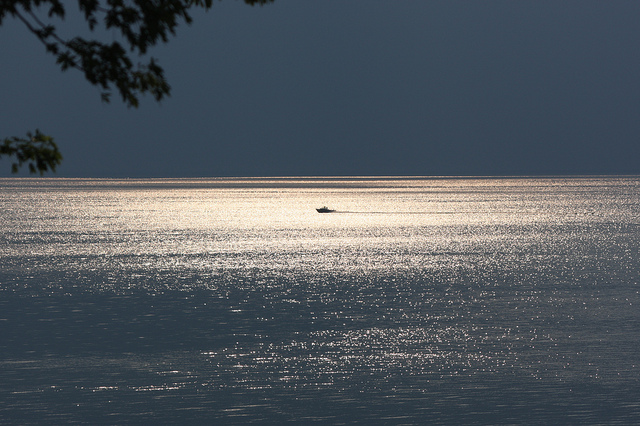Podcast: Play in new window | Download
Subscribe: RSS
On Saturday, August 13, the last commercial fishing boat working Lake Michigan out of Milwaukee, Wisconsin, passed the harbor breakwater outbound for the last time. Two hundred years of commercial fishing from Milwaukee was over, because Lake Michigan is virtually dead. It is not over-fishing that killed it — although the once-typical annual haul of 40 million pounds of fish would have done that before long — it was an invasive clam that did it.
No, not the zebra mussel, the invasive species that scared the gizzards out of marine biologists when it exploded into the Great Lakes in the 1990s. Although it managed to establish itself in many streams and lakes of the northern states, including the entire circumference of Lake Michigan, by 2000, within five years for some reason it almost completely vanished from the lake.
Only to be replaced by a close relative, the quagga mussel, that made its appearance around 2000 and by 2010 completely blanketed the lake bottom. The zebra mussel was a nuisance, known primarily for clogging the intakes of power plants and other ingesters of fresh water. The quagga mussel is a catastrophe. Each of the 900 trillion or so mussels filters, and removes the plankton from, about a quart of water a day. The plankton used to be fish food. Now it’s mussel food, For every pound of fish still swimming in Lake Michigan, there are three pounds of mussels sucking it up on the lake floor.
The lake is, of course, not dead. Commercial fishing on the lake is dead, but the lake is simply living a different way. This difference is far more than a distinction for the people who used to eat the 40-million pounds of fish every year, and for the people who made their livings catching, processing and selling the fish. And beyond that, there are implications of immortality for us all. An excellent story on the crisis, in the (Pulitzer-Prize-winning) Milwaukee Journal Sentinel, includes this observation:
“It’s fair to say that the old food webs, upon which many fisheries were dependent, those food webs don’t exist anymore,” says Hugh MacIsaac, a professor of biology at the University of Windsor and director of the Canadian Aquatic Invasive Species Network. “And it seems to me that the people reliant on the old food webs have very insecure futures, simply because the old food webs don’t exist anymore.”
This disaster cannot be blamed on industrial agriculture (for a change) or fossil-fuel consumption — although humans caused it by transporting the mussels from their home waters to the Great Lakes — it mirrors and adds to the growing stresses on the entire web of life on which our lives depend. It’s just another demonstration of the fact that we have very insecure futures, indeed.
-0-
[For updates on this and other Daily Impact stories, and for short takes on other subjects, check out The Editor’s Log.]
